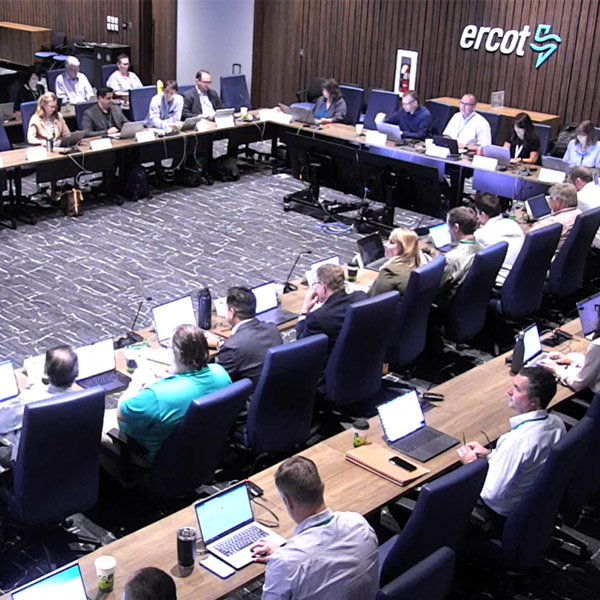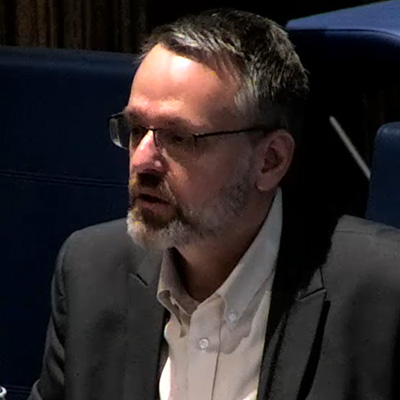ERCOT stakeholders endorsed a protocol change to the minimum state of charge for energy storage resources participating in two of the grid operator’s ancillary services.
ERCOT stakeholders on Tuesday approved a protocol change to the minimum state of charge (SOC) for energy storage resources participating in two of the grid operator’s ancillary services.
Staff are proposing to change the minimum SOC requirements for ERCOT contingency reserve service and nonspinning reserve service to slope from the full hourly amount of MW down to zero at the end of the hour. ERCOT says this will resolve the nodal protocol revision request’s “stranded energy” issue during scarcity conditions, which caused the Board of Directors to remand it back to the Technical Advisory Committee.
The directors sent NPRR1186 back to the committee during its August meeting, asking staff and members to address stranded energy associated with the proposed minimum SOC requirements for ECRS and non-spin during scarcity situations. The measure is seen as a stopgap until real-time co-optimization is added to the market in several years. (See “NPRR1186 Remanded to TAC,” ERCOT Board of Directors Briefs: Aug. 30-31, 2023.)
“I think it solves the problem we were asked to solve,” Dan Woodfin, ERCOT’s vice president of system operations, told TAC on Tuesday.
However, Woodfin said ERCOT is concerned that a battery participating in nonspin may by completely discharged for future hours and not be able to charge as needed. He said staff will recommend to the board that more NPRRs be drafted to add compliance and financial penalties related to failures to provide ECRS or nonspin under a mechanism that applies to other resources.
“We’ve got to make sure that we’re enforcing the right level of compliance around that,” he said. “Potentially, we would disqualify resources for repeated failure to perform or if they don’t perform when they’re deployed during a grid emergency or other event. We’ll put a little more structure around it before then.”
Woodfin said the change to failure-to-provide would only add “additional consideration that are the unique technical characteristics of batteries.” He promised fleshed-out NPRRs for the board’s December meeting.
Public Utility Commissioner Jimmy Glotfelty called into the meeting to gently dispute Woodfin’s contentions. He said ERCOT staff are “barking up the wrong tree,” and he encouraged them to think differently about the issue.
“You want to control when you want to control them … which is you want [batteries] to look like a coal plant,” Glotfelty said. “If you’re doing these penalties associated with this, why do you even need to know the state of charge? You’re putting bootstraps and suspenders on something that is not necessary, because the penalty structure within ERCOT will be enough for the market to solve this problem.”
Woodfin responded that ERCOT doesn’t want to “just assess whether someone has the capability of providing the service when we actually need it.”
“We’re spending a whole lot of time and effort on an interim measure that should be resolved with [real-time co-optimization],” Glotfelty said. “You’re not going to get any more reliability about the fact that whether you know a state of charge or not, and it’s discriminatory. So y’all can go about your process, but as it comes down to me at the commission, that’s where I stand.”
Baker Botts attorney Juliana Sersen, representing storage developer Eolian, reiterated her client’s stance opposing NPRR1186 in its current form. Eolian has been joined by other storage developers in pushing back against the measure.
“Even if the battery does not fail to provide or if the battery’s [qualified scheduling entity] moves its ancillary service resource responsibility to another resource, we continue to believe that such compliance metrics are unnecessary and discriminatory,” she said.
TAC endorsed the NPRR in a 29-1 vote. Competitive retailer AP Gas & Electric was the lone member to vote against the motion.
IBR Change Set Aside
The committee agreed with ERCOT staff to table a nodal operating guide revision request after Woodfin said the version approved by a TAC subcommittee does not resolve the reliability risk as originally intended.
“We feel that additional data would be helpful to further consideration by TAC and the board,” he said. “We want NOGRR245 to include requirements that improve the reliability of the system, maintain the current reliability … but do so in a way that’s technically feasible and that we’re not asking folks to do things that they just technically cannot do.”
Staff said they intend to issue requests for proposals to inverter-based resources (IBRs) and the original equipment manufacturers to provide comments for TAC’s Oct. 24 meeting.
The NOGRR would replace the current voltage ride-through requirements for intermittent renewable resources (IRRs) with IBRs’ ride-through requirement. The change would be consistent with or beyond requirements identified in the new Institute of Electrical and Electronics Engineers (IEEE) standard for IBRs’ interconnection and interoperability.
Eric Goff, holding NextEra Energy Resources’ proxy for much of the discussion, urged TAC to consider changing the compliance date for new resources to earlier than 2024 while providing some exceptions based on details to be determined. He also called for tightening up the technical feasibility sections.
“We’re happy to work on additional changes,” he said.
“I always believe we come up with a better product when we work together,” ERCOT’s Stephen Solis said.
LP&L’s Final Transition Delayed
Oncor’s Debbie McKeever, chair of the Retail Market Subcommittee, told TAC the final 30% of Lubbock Power & Light’s load, about 201 MW, is on track for a mid-December transfer into ERCOT.
The transfer hinges on FERC’s approval of a settlement agreement between LP&L and Xcel Energy subsidiary Southwest Public Service Co. (SPS), which has long held a contract to serve the city’s load.
Last month, an administrative law judge certified an uncontested settlement offer between LP&L, Xcel, Golden Spread Electric Cooperative and several New Mexico cooperatives. LP&L and SPS agreed to pay the cooperatives $6.38 million, while the Lubbock utility will pay SPS either $77.5 million in a lump sum or six annual installments of $14.95 million for early termination of a partial requirements agreement (ER23-1144).
The commission is expected to rule on the settlement by early December.
LP&L moved 70% of its load out of SPP in 2021, six years after it announced its intentions to join ERCOT’s competitive market. Texas regulators approved the transition in 2018. (See Six Years in the Making: LP&L Migrates Load to ERCOT.)
RTC+B Group Gets Leadership
The TAC’s unanimously approved combination ballot resulted in the approval of leadership for the Real-time Co-optimization + Battery Task Force. ERCOT’s Matt Mereness will chair the group, and CPS Energy’s David Kee will be vice chair.
The ballot also included tabling a planning guide revision request (PGRR105) that would add DC tie resources to the list of resources required to meet the minimum deliverability condition and the 2023 major transmission element list.
It also included one NPRR and a system change request (SCR) that, if approved by the board, would:
-
- NPRR1184: clarify ERCOT’s management of the interest it receives and is owed to counterparties for posted cash collateral and require staff to credit counterparty collateral accounts for interest every month. The NPRR also requires ERCOT to report the interest calculation.
- SCR824: increase the attachment file size and quantities allowed within the resource integration and ongoing operations system.





